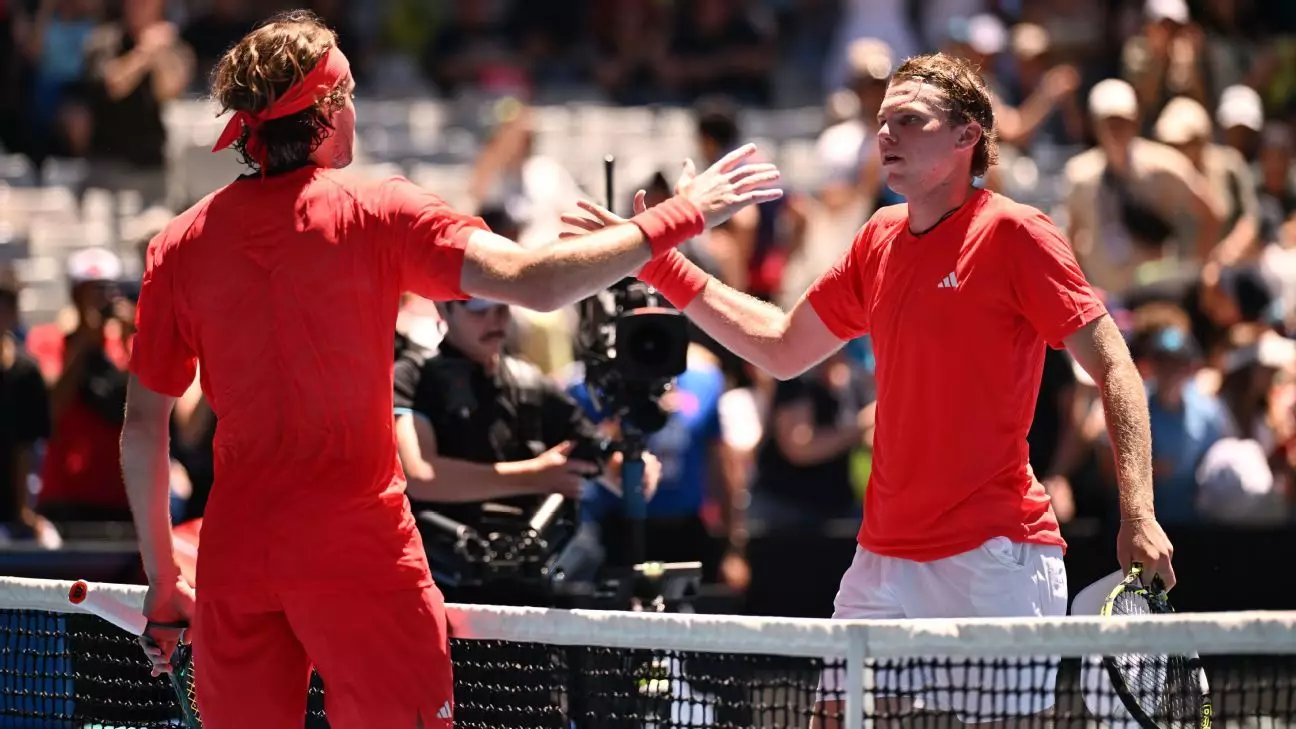In a stunning opening day at the Australian Open, Alex Michelsen delivered a breathtaking performance, knocking out Stefanos Tsitsipas, the No. 11 seed and 2023 runner-up. Their match on Monday showcased not only Michelsen’s impressive skills but also highlighted the unpredictability of tennis, particularly in Grand Slam tournaments. At just 20 years old, Michelsen demonstrated remarkable composure and strategic prowess, overcoming both the pressures of tournament play and the formidable experience of his Greek opponent.
The match concluded with a thrilling scoreline of 7-5, 6-3, 2-6, 6-4, marking a significant milestone in Michelsen’s budding career. Despite the fluctuations in momentum, he maintained a relentless approach, particularly in the critical fourth set. Serving confidently yet facing moments of uncertainty, Michelsen exhibited a blend of aggression and strategic play that caught Tsitsipas off guard. He recorded an impressive total of 46 winners, showcasing his ability to take risks and capitalize on scoring opportunities. This aggressive gameplay starkly contrasts with the typical patterns observed in tennis, where more established players often dictate the pace and style of play.
Reflecting on his journey, Michelsen credited his mother, Sondra, for instilling a love for tennis and a work ethic that paved the way for his current success. He fondly recalled their rigorous training sessions during his youth, revealing the foundations of his game that were built over countless hours on the court. “We would go out there and she would never miss a ball. No chance I’d be here without her,” he admitted to the cheering crowd. Such personal insights not only reveal the influence of family support in professional sports but also highlight the dedication required to reach the upper echelons of competitive tennis.
Michelsen’s triumph was not the only highlight for American players on the day. Frances Tiafoe, the No. 17 seed, also advanced to the second round after a grueling five-set match against seasoned French player Arthur Rinderknech. Tiafoe’s resilience shone through as he battled through physical discomfort that reached a peak when he vomited at the end of the fourth set. His ability to bounce back and secure victory in over four hours of intense play illustrates the mental fortitude required on the ATP circuit, particularly in a Grand Slam setting.
For Tsitsipas, the loss represents a continuation of his struggles in major tournaments, having also suffered first-round exits in the previous year’s US Open. His ambitions were grand, as articulated in his pre-match reflections—seeking to make a deep run at the Australian Open while forgoing doubles to focus on singles competition. Yet, tennis has an unforgiving nature; even the most seasoned players must remain vigilant against rising talents. Tsitsipas’s commentary on his performance—acknowledging the role of “karma”—reflects a profound understanding of the sport’s competitive spirit.
As Michelsen advances to the second round, all eyes will be on him to see if he can sustain this momentum. The unseeded player’s ability to conquer a top-11 seed not only raises his profile but also sets the stage for potentially more upsets throughout the tournament. The psychological aspect of sports plays a pivotal role here; having tasted success against a formidable opponent, Michelsen might enter his next match with enhanced confidence and fewer nerves.
The world of tennis, rich in drama and human experience, showed its unpredictability and allure once again on this day, laying the groundwork for what promises to be an exhilarating championship filled with surprises and fierce competition.

